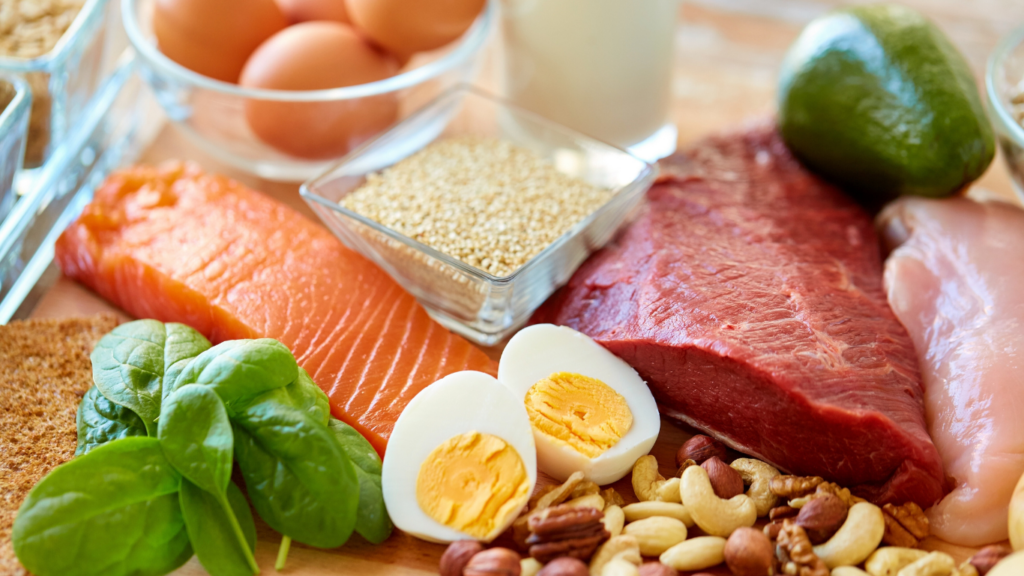Importance Of Nutrition In Athletic Performance
Nutrition directly impacts an athlete’s energy, strength, and recovery. Proper dietary intake ensures the body has the necessary fuel for optimal performance during training and competition. Without adequate nutrients, energy levels drop, muscles fatigue faster, and recovery becomes prolonged, increasing the risk of injury.
Macronutrients like carbohydrates, proteins, and fats play critical roles. Carbohydrates provide quick energy for high-intensity activities like sprinting or weight lifting. Proteins support muscle repair and growth, especially after rigorous workouts. Healthy fats sustain prolonged endurance activities by supplying long-lasting energy.
Hydration also affects athletic performance. Dehydration impairs cognitive function, coordination, and endurance. Consuming enough fluids before, during, and after exercise helps maintain electrolyte balance, preventing cramps and reducing fatigue.
Micronutrients such as vitamins and minerals strengthen immunity and improve oxygen delivery. For example, iron aids oxygen transport for endurance sports, and calcium supports bone health, reducing the risk of stress fractures.
Nutrition planning creates consistency in performance. Athletes who prioritize balanced diets aligned with their training schedules perform better and recover faster than those who don’t.
Tip 1: Prioritize Hydration
Staying hydrated enhances athletic performance by maintaining optimal body function during training and competition. Even mild dehydration, a loss of 1-2% of body weight in fluids, reduces endurance and increases fatigue. Hydration supports muscle function, regulates body temperature, and improves cognitive focus.
I recommend drinking water throughout the day rather than only before or after workouts. For high-intensity activities lasting over 60 minutes, sports drinks with electrolytes, like sodium and potassium, help replenish lost minerals. Monitor urine color as a quick indicator—pale yellow usually indicates adequate hydration.
Factoring in weather conditions and sweat rates is essential in hydration planning. Hotter climates or high-altitude environments increase fluid loss, requiring frequent hydration. Using hydration strategies consistently ensures that performance remains steady and recovery improves.
Tip 2: Balance Macronutrients
Balancing macronutrients—carbohydrates, proteins, and fats—supports consistent energy, efficient recovery, and sustained performance. Each macronutrient offers unique benefits, and adjusting their intake based on training intensity is vital for athletes.
Role Of Carbohydrates
Carbohydrates serve as the primary energy source for high-intensity and endurance activities. They replenish glycogen stores, ensuring sustained output during training and competition. Consuming complex carbohydrates, like whole grains and oats, maintains energy levels throughout the day. Simple carbohydrates, such as fruits or energy gels, boost performance during prolonged physical exertion. For optimal results, I match carbohydrate intake to exercise duration and intensity.
Importance Of Proteins
Proteins are critical for muscle repair and recovery, especially after intense exercise. Consuming high-quality protein sources like lean meats, eggs, and plant-based options accelerates muscle rebuilding and reduces soreness. I include protein-rich snacks, such as Greek yogurt or protein shakes, within 30 minutes of training. Aiming for 1.2 to 2.0 grams of protein per kilogram of body weight daily supports strength and endurance adaptations.
Healthy Fats For Energy
Healthy fats sustain energy for long-duration activities and aid nutrient absorption. Including sources like avocados, nuts, seeds, and olive oil promotes endurance and reduces inflammation. I incorporate fats during meals rather than pre-workout since they digest slower and aren’t ideal for fueling immediate activity. Aiming for approximately 20-35% of total caloric intake from fats ensures long-term energy balance and optimal health.
Tip 3: Timing Your Meals
Eating at the right times enhances energy availability and recovery for athletes. Proper meal timing helps stabilize blood sugar levels, optimize glycogen stores, and improve overall performance.
- Pre-Workout Meals: A meal rich in carbohydrates and moderate in protein consumed 2–3 hours before training ensures adequate energy. Include foods like whole-grain bread, brown rice, or oatmeal, paired with lean proteins such as chicken or eggs.
- Post-Workout Nutrition: Refueling within 30–60 minutes after exercising maximizes glycogen restoration and muscle repair. Combine high-glycemic carbohydrates like fruits or white rice with lean proteins such as whey protein or turkey for effective recovery.
- Snacks Between Meals: Eating balanced snacks every 3–4 hours maintains steady energy levels. Select nutrient-dense options like nuts, yogurt, or fruit to prevent fatigue during long training sessions.
Meal timing should align closely with the intensity and duration of physical activity to provide optimal support. It’s essential to plan meals around workouts for sustained performance and faster recovery.
Tip 4: Incorporate Whole Foods
Including whole foods in an athlete’s diet ensures access to a wide range of nutrients that processed options often lack. Whole foods support sustained energy, quicker recovery, and reduced inflammation, benefiting overall performance.
Benefits Of Fruits And Vegetables
Fruits and vegetables provide essential vitamins, minerals, antioxidants, and fiber. These nutrients strengthen the immune system, reduce oxidative stress, and aid muscle recovery. Colorful options like spinach, sweet potatoes, blueberries, and oranges are rich in vitamin C, potassium, and phytonutrients that boost performance. Including a variety of colors ensures you receive a broad spectrum of nutrients.
Choosing Whole Grains
Whole grains like quinoa, oats, and brown rice offer complex carbohydrates, fiber, and essential micronutrients like magnesium and iron. These nutrients maintain energy levels during prolonged physical activity and replenish glycogen stores post-exercise. Whole grains digest slower than refined grains, preventing energy crashes. Incorporating them into meals stabilizes blood sugar and supports sustained athletic output.
Tip 5: Post-Workout Recovery Nutrition
Fueling the body after exercise accelerates recovery, replenishes energy stores, and supports muscle repair. Post-workout nutrition affects how quickly athletes recover and prepare for the next session.
Focus on Carbohydrates and Protein
Consuming carbohydrates and proteins within 30–60 minutes post-workout enhances glycogen restoration and muscle recovery. A ratio of 3:1 (carbohydrates to protein) is commonly recommended for endurance athletes. For example, pairing a banana with a protein shake or a turkey sandwich with whole-grain bread delivers these nutrients effectively.
Include Hydration
Post-exercise hydration restores fluids lost through sweat, maintaining electrolyte balance. Athletes can consider water with electrolytes or drinks containing sodium for rehydration. Milk can also be an excellent option due to its protein and electrolyte content.
Add Anti-Inflammatory Foods
Incorporating anti-inflammatory foods, like tart cherries or fatty fish such as salmon, reduces post-exercise inflammation. These foods help alleviate muscle soreness and speed up the recovery process.
Set Portions Based on Session Intensity
Match meal size and macronutrient distribution to workout intensity. For high-intensity sessions, increase carbohydrates and protein intake to meet heightened recovery demands. For lighter sessions, emphasize a smaller, nutrient-dense meal.
Tip 6: Avoid Processed Foods And Sugars

Processed foods and added sugars negatively impact energy levels and overall performance. These foods often lack essential nutrients and contribute to inflammation and fatigue. Athletes relying on heavily processed snacks or sugary drinks risk energy crashes during training or competition, which can impair endurance and focus.
I focus on nutrient-dense alternatives, such as whole grains, fruits, and vegetables, to maintain consistent energy levels. For example, replacing sugary cereals with oatmeal or energy bars with a banana and almond butter provides lasting fuel and essential nutrients. Natural food sources contribute to better recovery and reduced inflammation compared to their processed counterparts.
High sugar intake increases the risk of insulin spikes and subsequent blood sugar drops. This fluctuation disrupts energy stability, especially during prolonged exertion. I limit added sugars by checking ingredient labels and avoiding products with high-fructose corn syrup, artificial sweeteners, or excess syrups. Choosing unsweetened yogurt over flavored options or using natural honey sparingly as a sweetener are simple strategies to lower sugar consumption.
Processed foods often contain unhealthy trans and saturated fats, excess sodium, and preservatives. Regular consumption of these additives can decrease cardiovascular health and performance output. I prioritize meals made from scratch with fresh ingredients, ensuring better nutrient profiles and fewer harmful substances that could hinder athletic outcomes.
Tip 7: Plan Pre-Game Meals Strategically
Pre-game meals provide the necessary fuel to maximize athletic performance during competition. I focus on consuming foods that are easy to:
- digest
- high in carbohydrates
- moderate in protein
- low in fats
These choices ensure sustained energy and reduce the risk of discomfort during activity. For instance, meals like grilled chicken with quinoa or a turkey sandwich on whole-grain bread are effective options.
I prioritize timing when planning pre-game meals. Eating 2–4 hours before the event gives the body enough time to digest and optimize glycogen stores. If there’s less than 2 hours, I stick to lighter snacks such as a banana with peanut butter or a small bowl of oatmeal to top off energy levels without causing stomach upset.
Hydration also plays an essential role. I drink water consistently leading up to the game and include sports drinks with electrolytes for extended events or hot conditions. This approach maintains fluid balance and prevents dehydration, which can negatively impact endurance and focus.
Finally, I avoid high-fiber, spicy, or greasy foods before competition. These can slow digestion and lead to discomfort, hindering performance. Planning pre-game meals thoughtfully ensures my body has the right fuel to perform at its peak.
Tip 8: Experiment With Supplements Carefully
Supplements can support athletic performance but shouldn’t replace a balanced diet. I focus on meeting nutritional needs through whole foods first, as they provide essential vitamins, minerals, and energy.
When incorporating supplements, I choose products backed by scientific evidence. Popular options include protein powders for muscle recovery, creatine for strength improvements, and caffeine for enhanced focus during endurance events. For safety, I only select supplements verified by trusted organizations like NSF Certified for Sport or Informed-Sport.
I introduce new supplements one at a time during training phases, not before competitions, to monitor how my body reacts. Consulting a registered dietitian or sports nutritionist helps tailor supplement choices to my specific needs and avoid potential side effects, ensuring they align with my performance goals.
Tip 9: Monitor Your Calorie Intake
Maintaining an appropriate calorie intake ensures sustained energy levels and supports overall performance. Athletes burn more calories during training and competition, making it essential to align calorie consumption with activity levels to avoid deficits or excesses.
Tracking daily intake helps identify patterns and adjust as needed. For example, endurance athletes performing prolonged activities may require higher calorie levels, while athletes in weight-sensitive sports might need more precise monitoring to prevent unwanted weight changes. Tools like food tracking apps or consulting with nutrition professionals can simplify this process.
Calorie quality matters as much as quantity. Choose nutrient-dense foods like lean proteins, whole grains, fruits, and vegetables to maximize energy production and recovery. Avoid empty calories from sugary snacks or drinks, as they provide little nutritional benefit and can lead to fatigue or inflammation.
Adjustments should reflect training intensity, type, and duration. Heavier training days may call for more calories to fuel performance, while lighter days might require fewer to maintain balance. Seasonal changes, like off-peak training or competition periods, also impact calorie needs.
Tip 10: Listen To Your Body’s Signals
Understanding your body’s signals helps tailor nutrition and improve performance. Paying attention to hunger, fullness, energy levels, and recovery cues ensures optimal fueling strategies.
- Hunger And Fullness: Eating when hungry and stopping at comfortable fullness prevents overeating or under-fueling. For example, consuming a nutrient-dense snack like a handful of almonds satisfies cravings without overloading calories.
- Energy Fluctuations: If energy levels dip or spike excessively during the day, adjusting meal composition, frequency, or macronutrient balance can help. Adding complex carbs like oats or proteins like boiled eggs to meals stabilizes energy.
- Performance Indicators: Fatigue, decreased endurance, or extended recovery times might signal insufficient calorie or nutrient intake. Incorporating lean proteins like grilled chicken and iron-rich vegetables like spinach supports muscle repair and oxygen delivery.
- Dehydration Signs: Symptoms like dark urine, headaches, or dry mouth suggest inadequate hydration. Increasing water intake and including electrolyte-rich beverages can resolve these issues, especially after strenuous training.
Tracking these signals consistently helps fine-tune dietary habits to support peak athletic performance.





